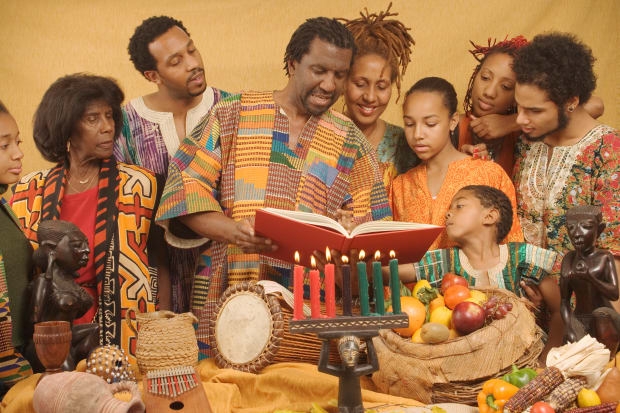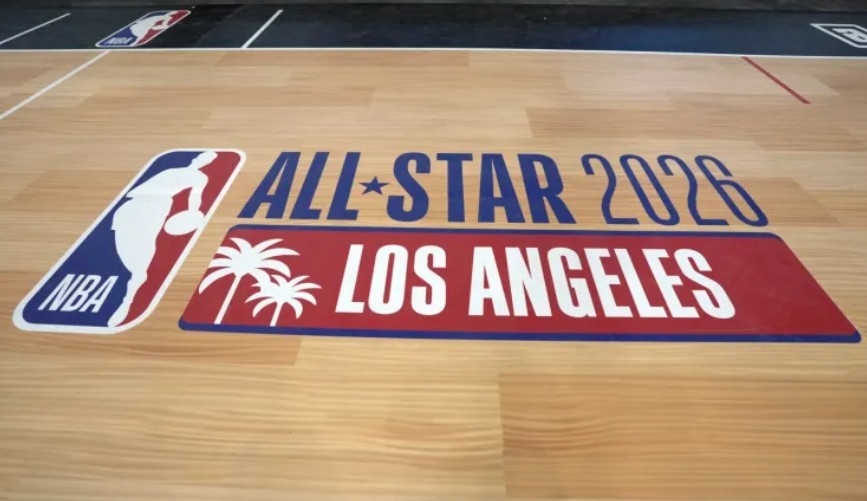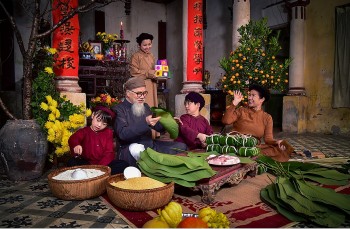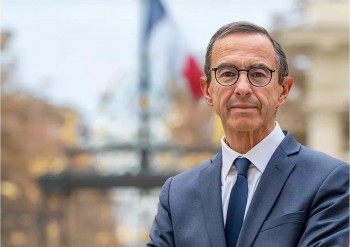Kwanzaa Festivals: Celebrating African American Culture and Heritage
What is Kwanzaa?
Kwanzaa is a yearly celebration that is mostly observed in the United States from December 26 to January 1 and affirms African family and social values. Maulana Karenga, a prominent figure in Afrocentrism and professor of Africana studies at California State University in Long Beach, came up with the name and the celebration in 1966. Karenga took the word kwanza, which means "first," from the Swahili phrase matunda ya kwanza. To make the word long enough to fit one letter for each of the seven children attending an early celebration, they added an extra an as the seventh letter. (Kwanzaa is not a Swahili word in and of itself.) Kwanzaa is based on the first-fruits celebrations in Southern Africa.
Despite being primarily an African American holiday, Kwanzaa is now observed outside of the US, especially in the Caribbean and other nations with sizable African American populations. It is not regarded as a replacement for Christmas and was intended to be a nonreligious and nonpolitical holiday.
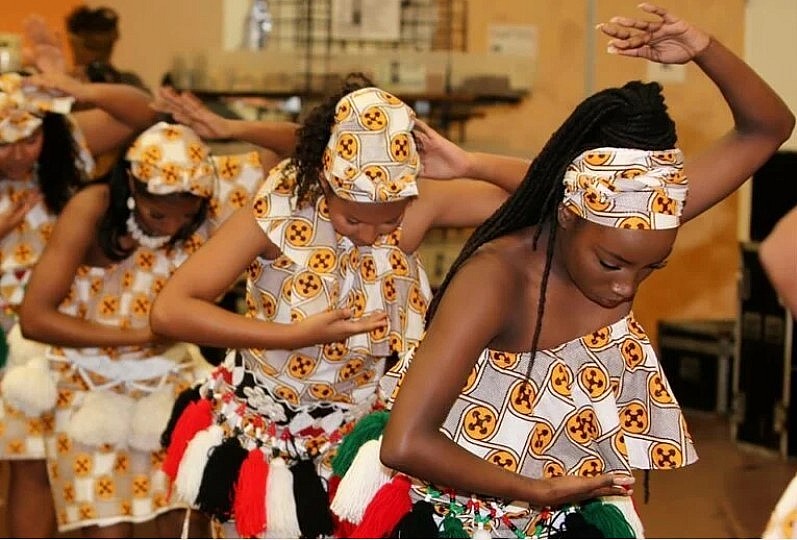 |
| The African American Dance Ensemble for Kwanzaa Celebration |
Key Facts About Kwanzaa• Non-Religious: Kwanzaa is a cultural celebration and not tied to any specific religion. It can be observed alongside Christmas or other religious holidays. • Inclusivity: While rooted in African American culture, Kwanzaa welcomes people of all backgrounds to participate and learn. • Symbolism: Every element of Kwanzaa, from the kinara to the decorations, carries symbolic meaning. • Global Reach: While primarily celebrated in the United States, Kwanzaa has gained recognition in other countries, including Canada and the United Kingdom. |
Overview: Kwanzaa Celebrations
Dates
Kwanzaa is a seven-day festival celebrated from December 26 to January 1 every year. Each day is dedicated to one of the seven principles, known as the Nguzo Saba, which provide the foundation for the celebration.
Location
Kwanzaa celebrations occur in various locations, including homes, community centers, schools, and cultural institutions across the United States and beyond. Major cities like New York City, Los Angeles, Chicago, and Atlanta often host public events and festivals that are open to all.
How to Watch or Visit
• Community Events: Many cities host public Kwanzaa celebrations featuring performances, workshops, and feasts. Check local listings for events near you.
• Virtual Celebrations: With the rise of online events, some organizations host virtual Kwanzaa gatherings, including livestreamed discussions, performances, and rituals.
• Family Observances: Kwanzaa is also celebrated privately in homes, where families come together to light candles, reflect, and share meals.
Activities and Events
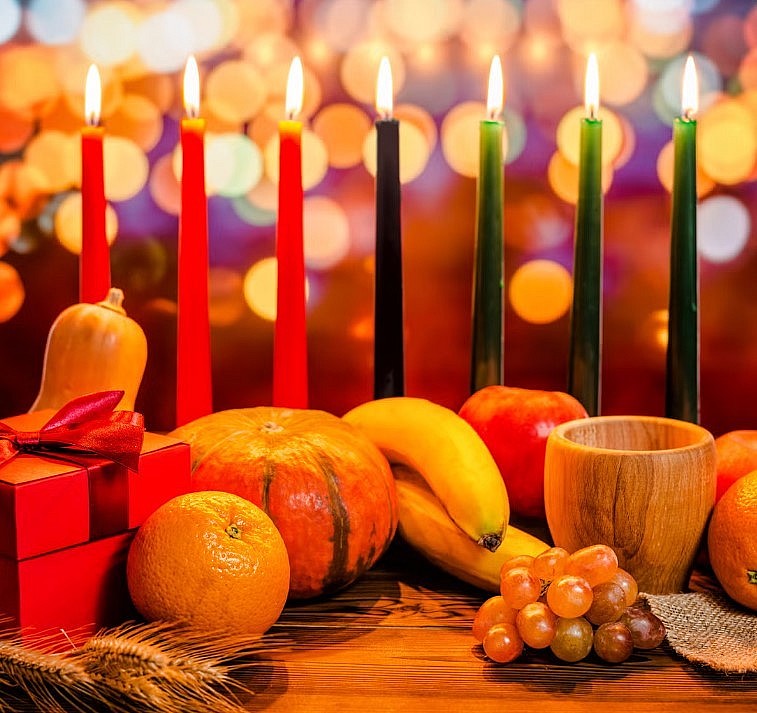 |
| Kwanzaa is celebrated from December 26 to January 1 |
Kwanzaa celebrations are rich in tradition and creativity, offering a variety of activities that engage participants in meaningful ways. Below are the key components of Kwanzaa festivities:
1. Lighting the Kinara
At the heart of Kwanzaa is the kinara, a candle holder that holds seven candles: three red, three green, and one black.
- Symbolism:
- The black candle represents unity (Umoja).
- The red candles symbolize struggle.
- The green candles represent hope and the future.
- Ritual: Each evening, families light one candle and discuss the principle of the day, fostering meaningful conversations about its relevance to their lives and community.
2. The Seven Principles (Nguzo Saba)
The festival revolves around seven principles, each celebrated on a specific day:
- Unity (Umoja): Strengthening family, community, and nation.
- Self-Determination (Kujichagulia): Defining oneself and speaking for oneself.
- Collective Work and Responsibility (Ujima): Building and maintaining the community.
- Cooperative Economics (Ujamaa): Supporting African American businesses and wealth creation.
- Purpose (Nia): Reflecting on goals that benefit the community.
- Creativity (Kuumba): Celebrating artistic expression and innovation.
- Faith (Imani): Believing in self, family, and community.
Discussions around these principles inspire personal growth, cultural pride, and a collective vision for the future.
3. Music and Dance
Music and dance are integral to Kwanzaa celebrations, showcasing the rich cultural heritage of Africa and the African diaspora.
- Drumming: African drums create a rhythmic heartbeat for the festival, symbolizing connection and vitality.
- Dance Performances: Traditional African dances, as well as contemporary interpretations, bring energy and joy to gatherings.
- Singing: Songs in African languages or inspired by African American traditions often accompany rituals and ceremonies.
4. Storytelling and Poetry
Storytelling is a powerful way to connect with cultural roots during Kwanzaa. Elders and storytellers share folktales, historical accounts, and personal experiences to impart wisdom and inspire reflection.
- African Folktales: Stories featuring ancestral heroes, animals, and moral lessons are often told.
- Poetry Readings: Poets celebrate themes of identity, resilience, and empowerment through spoken word.
5. Feasts (Karamu)
On the sixth day of Kwanzaa, a feast known as Karamu is held. This communal meal is a highlight of the celebration and often includes traditional African and African American dishes.
- Foods:
- Jollof rice, collard greens, and sweet potatoes.
- Fried plantains, black-eyed peas, and gumbo.
- Desserts like sweet potato pie and banana pudding.
- Symbolism: The feast represents unity and gratitude, bringing families and communities together.
6. Crafts and Art
Kwanzaa encourages creativity and the celebration of African art and crafts:
- Making Kwanzaa Symbols: Families create decorations, such as mats (Mkeka), which symbolize the foundation of African heritage.
- Adorning the Kinara Table: Tables are decorated with crops (Mazao), unity cups (Kikombe cha Umoja), and other symbolic items.
- Art Exhibits: Many public events feature art displays by African American artists.
History of Kwanzaa
Origins
Kwanzaa was created in 1966 by Dr. Maulana Karenga, an African American professor and activist.
- Inspiration: The festival draws from African harvest celebrations, such as those of the Ashanti and Zulu people, and adapts them to the African American experience.
- Purpose: Kwanzaa was established during the Black Power Movement to reaffirm African American identity, culture, and values in the wake of the civil rights struggle.
The Name
The word "Kwanzaa" comes from the Swahili phrase matunda ya kwanza, meaning "first fruits." The additional "a" was added to reflect the seven principles and distinguish the celebration.
Significance of Kwanzaa
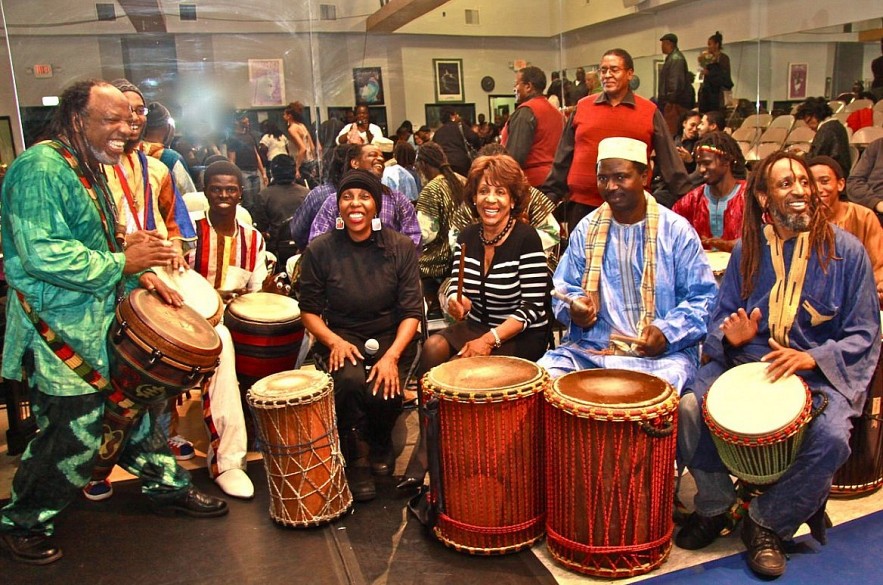 |
| Kwanzaa Festival |
Kwanzaa is more than a festival; it is a cultural and spiritual observance that fosters:
• Cultural Pride: By reconnecting with African roots, Kwanzaa celebrates the beauty and resilience of African heritage.
• Community Building: The festival emphasizes unity and collective responsibility, strengthening bonds within families and communities.
• Reflection and Renewal: Kwanzaa provides a moment to reflect on the past, celebrate achievements, and envision a better future.
Tips for Celebrating Kwanzaa• Prepare in Advance: Gather symbolic items like the kinara, candles, and decorations before the festival begins. • Learn the Principles: Familiarize yourself with the seven principles to fully engage in the rituals. • Host a Feast: Organize a Karamu with friends and family, incorporating traditional foods and discussions about the principles. • Support Black-Owned Businesses: Honor the principle of cooperative economics by shopping at Black-owned stores or purchasing from African artisans. • Get Creative: Create handmade decorations or art inspired by African heritage. • Participate in Public Events: Attend local Kwanzaa celebrations to connect with the broader community. |
Conclusion
Kwanzaa is a beautiful and meaningful festival that honors African American culture, history, and values. Through rituals like lighting the kinara, sharing meals, and celebrating creativity, it provides a unique opportunity to reflect on heritage, strengthen community bonds, and look forward with hope. Whether observed privately or in public gatherings, Kwanzaa embodies the spirit of unity and cultural pride, making it a powerful way to end the year.
FAQs About Kwanzaa
1. Is Kwanzaa a religious holiday?
No, Kwanzaa is a cultural celebration and is not associated with any particular religion. It can be celebrated by people of all faiths.
2. Who can celebrate Kwanzaa?
Kwanzaa is open to everyone, regardless of background. While it celebrates African American culture, anyone can participate and learn about its values.
3. What are the seven principles of Kwanzaa?
The seven principles are: Unity (Umoja), Self-Determination (Kujichagulia), Collective Work (Ujima), Cooperative Economics (Ujamaa), Purpose (Nia), Creativity (Kuumba), and Faith (Imani).
4. What is the significance of the kinara?
The kinara represents African heritage and holds seven candles that symbolize the seven principles of Kwanzaa.
5. How can I celebrate Kwanzaa if I’m new to it?
Start by learning about the principles, gathering symbolic items, and participating in public events. You can also host a small gathering to discuss the principles and enjoy a communal meal.
6. Can Kwanzaa be celebrated alongside Christmas?
Yes, Kwanzaa can complement Christmas or other religious holidays, as it is a cultural rather than religious celebration.
Kwanzaa invites everyone to celebrate the richness of African American culture, making it a festive and meaningful way to end the year.

